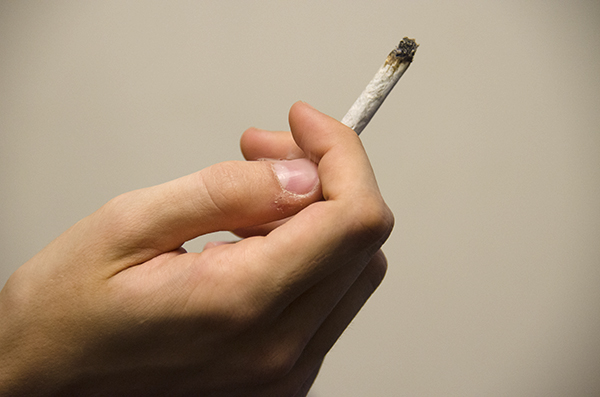
SUNY New Paltz President Donald Christian wants to be blunt – after weeding through different options, he thinks changing the campus’ marijuana policy would be a dopey idea.
However, some students seem to disagree.
Student Senator and Executive Vice President-elect Zachary Rousseas said during his campaign that one of his main goals on the E-board would be attempting to change SUNY New Paltz’s “No Second Chance” policy, which currently allots students two “strikes” when being charged with marijuana-related offenses.
Currently, SUNY New Paltz’s policy for a student’s first marijuana related offense is no less than disciplinary probation and educational intervention, but not more than expulsion. Penalties for a student’s second offense are listed as not less than expulsion.
Rousseas said he hopes that once next semester begins, the Student Association (SA) E-board can figure out new ways to hash out a more student-friendly marijuana policy with administrators.
“It’s an issue that a lot of students care about, it’s an issue that has negative effects on many students and it’s an issue that something we as an American society are dealing with on a very large scale, so I think we should be dealing with it on a New Paltz scale too,” Rousseas said. “It’s the right time.”
Currently, most SUNY schools have adopted three-strike policies for marijuana offenses.
SUNY Albany’s student’s rights and responsibilities state that if a student is caught possessing or using marijuana on their first offense, action can be taken by the college. However, expulsion is not mentioned as a subsequent penalty.
SUNY Oswego has a similar policy, with most violations leading to disciplinary probation for offenses.
Christian said that over the last three years, 277 students have received a first use judicial violation while eight students have faced penalties for a second violation. These numbers, according to Christian, show that SUNY New Paltz’s policy is working.
“Some students shared that they know ‘countless’ students who have faced that second violation. There were eight in three years, though there might be another one pending,” Christian said. “There is some misunderstanding and some myth out there of how prevalent second violations are.”
In addition, Christian said the average GPA of undergraduate students facing a second marijuana violation is 2.4, under the 3.18 campus-wide averages.
“I have to ask myself why any responsible administrators who cares about the academic progress of students would want to change a policy like this and to encourage more students to use [marijuana] more often,” Christian said.
Rousseas said whatever the numbers suggest, SUNY New Paltz should “align” itself with other schools. The student senator said the small sample size of second offense violations does not allow for accurate conclusions to be drawn about the success of the “No Second Chance” policy.
“To me, if it’s a small population, the data you find from that is entirely irrelevant,” Rousseas said. “A small polling pool doesn’t give you accurate results. It doesn’t matter what your GPA is, if you are a student here, you have every right to study here – no matter what recreational drug you use, or whatever you do in your spare time. I think that argument is entirely illogical.”
Christian said another option to consider when discussing the possible change in the school’s marijuana policy is the reputation of the school to outside sources.
“Clearly students are key; we wouldn’t exist without students,” Christian said. “But there are a lot of other people – parents, alumni, public media, legislators – and I have to think about: maybe students would like a more relaxed policy, but what do these other constituencies of the college think about that?”
While Christian believes a change in policy may have a negative effect on SUNY New Paltz’s reputation, Rousseas said he thinks the exact opposite.
If SUNY New Paltz were to adopt a three-strike policy, Rousseas said it would send a message to outsiders that the college takes student concerns seriously and has them in mind in every policy decision they make.
“I think it would help our reputation by showing that we actually have student-friendly policies no matter what the situation is,” Rousseas said. “[A three strike policy] would obviously be a switch toward a more student-friendly policy. Showing that our administrators care enough to put their political beliefs aside and give us a student-friendly policy would help our reputation.”
Moving forward, Rousseas said he hopes next semester’s SA E-board will draft legislation in support of a three-strike marijuana policy after discussing the situation with more students.
Meanwhile Christian said he has not closed the door to conversations regarding the policy.
“I don’t want to be dogmatic, and I don’t want to say I wouldn’t talk about it, but those are the pieces that I think about when I think about entertaining a request like that,” Christian said. “I think there are many more things students could be directing their initiatives toward than that one.”


The policy is way to intrusive into the lives of the students. If a student chooses to use recreational marijuana it is NO business of the school. If it is a concern, report them to Campus Police. This policy did not exist in the 80’s when I went to NP. Marijuana use was widespread, yet caused no problems on campus.
What is a “marijuana related offense”? Is it an uptight RA reporting you or an arrest? In the former, it has no bearing on student life. Stay out of student’s personal lives and get back to educating.